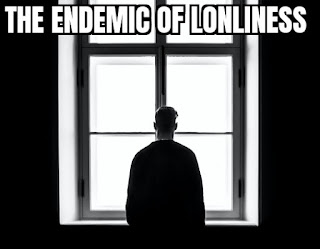The Endemic of Lonliness
After reading a few reports, compounded with a flurry of tweets over the weekend, within the areas I work in Social Care and Health, I've been giving the endemic with regard to loneliness, some thought.
The concerns aren’t new, and they have been around for some time. Certain people may point to the covid 19 pandemic; however, it is clear as highlighted by National Statistics that this issue was around pre covid 19. Statistics already showed that age longevity had been dropping for a few years before the pandemic. Loneliness was posited as a theory for this at the time, reflecting by people dying earlier through just a loss of interest in life.
The question arises: Why in this world when we have access to technology that gives us instance access to our friends, family, and loved ones, that why do we feel lonely?
This was further highlighted to me and gave me quite a surprise in the last week. I'd been invited to participate in an NHS Peer Leader activity involving testing an app to help patients for social prescribers to communicate their wants and needs better.
The app in early development, led me through a series of questions. Trying to pinpoint areas where I may have issues. I knew it was a test, and it's an app, but going through it, I soon found that I'd forgotten these things and was found to be engaging with it enthusiastically. The whole thing was interesting, and though done remotely, I was being watched throughout the exercise. The developer even later commented and asked me why I'd sunken my shoulders at a particular question.
I digress here a bit, as it's not relevant, but I just wanted to point out that it felt brilliant. If you've been through Social Care and the NHS process as often as I have certain questions do seem, though, we'll meant, irrelevant. This wouldn't have been picked up any other way.
Back to the article and loneliness. The app, at one point, asked me for a list of items that were relevant to my situation. One of those I picked was loneliness. Completely without conscious thought. It then asked me to delve deeper into this.
It was quite an eye opener when I started typing about why I felt lonely. Let me explain, due to my disabilities which affect nearly all parts of my body, I have 24/7 care.
The issue that came to my mind is how, as someone who is surrounded by people all the time, how can I be lonely? I have a good circle of friends and family all who love me, yet there's a deeper feeling that a part of me feels alone.
After many contemplations over the weekend, I came to realise that in todays society, even with all the electronic assistance to help us communicate, we miss out on the emotional, spiritual and togetherness. I think of it like this: at a basic level, the world is made of atoms, energy, and life, which exists when like or relevant type of atoms interact or collide with each other (sorry I’m not a atomic scientist this is more my dyslexic brain trying to picturise ideas). It is essential this interaction through attraction happens at a social level; this creates friction that produces heat. What if this happens adinfintum?
Though we are a sum of atoms, we still need to be close and interact with each other physically to produce heat (or call it love or compassion). Something that can't be done electronically. Maybe it's a natural product of our existence.
So, how do we ensure this happens and that people feel less alone? Let's just stop rushing around (not colliding) in our own worlds. Too busy on our own path and not connecting. My involvement with Equalities and inclusion takes me back to Gordon Allport, the American psychologist who wrote the nature of discrimination. He theorised that in order to defeat racism we needed more day-to-day inclusion. Is it a reach that to help with loneliness? We again need more inclusion. not just walk past, in the office type inclusion, we need to work through to a higher level of inclusion through attraction of similar bonds.
We need everyone mixing, with each
other not through need but via a sharing
of ideas, principles, and joy. The
elderly giving their wisdom and experience to the young. The young gave their
joy and enthusiasm to the elderly. We need to live not in communities of equal
wealth, estates all the same, and keeping up with the Jone’s. We need
communities that mix and are involved in each others lives on a day-to-day
basis. We don't need care homes; where
people are practically locked away from society, we need care communities all
taking responsibility. It may seem a bit wishful, but there are plenty of
examples around the Nordic states that live this sort of society. Is it that
hard for us to try the same?



Comments
Post a Comment